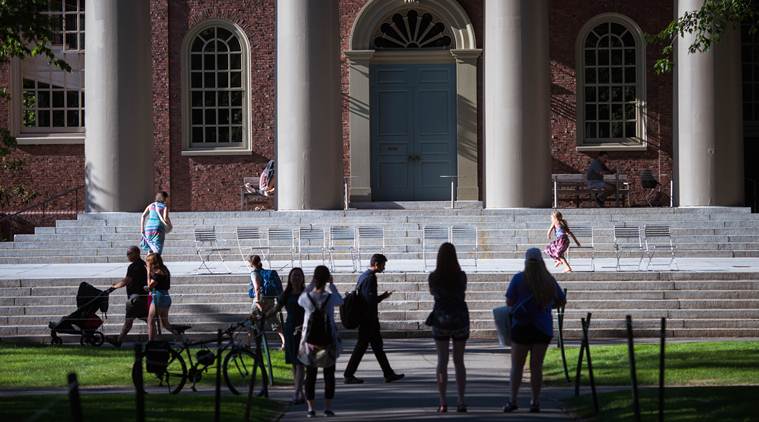 Schools such as Harvard, Princeton, and Georgetown have already announced mostly remote-learning semesters. (Gretchen Ertl/The New York Times)
Schools such as Harvard, Princeton, and Georgetown have already announced mostly remote-learning semesters. (Gretchen Ertl/The New York Times)
IN A SHOCK to international students studying in the US, the Immigration and Customs Enforcement (ICE) has come out with a directive saying they won’t be allowed to stay in the country if their Fall classes are moving entirely online. Any person entering the US or staying there in violation of this can potentially be deported.
While the coronavirus pandemic has disrupted academic calendars, students had been hopeful as the ICE’s Student and Exchange Visitor Program had earlier allowed foreign students to stay to finish their spring and summer courses online.
The ICE directive, issued Monday US time, applies to the F-1 non-immigrant visas for academic work and M-1 non-immigrant visas for vocational coursework. It requires school officials to issue new visa forms by August 4 and to submit operational plans by July 15 if they are online-only, and August 1 otherwise.
Schools such as Harvard, Princeton, and Georgetown have already announced mostly remote-learning semesters. Now,it is up to the universities to decide whether they would allow in-person courses, even if limited, to help international students stay. The ICE press release also suggested students consider options such as “transferring to a school with in-person instruction to remain in lawful status”.
A little over 46,000 F-visas (which include students’ family members) were issued to Indians in 2019, roughly 11% of the total 3.9 lakh such visas issued that year, records of the US State Department show. Among the total 9,500 M-visas last year, 714, or 7.5%, went to Indians.
Sources in New Delhi said Foreign Secretary Harsh Vardhan Shringla had raised the matter of the F-1 visa in his virtual meeting with American counterpart US Under Secretary for Political Affairs David Hale. “The US side said they will keep the best interests of the students in mind and would try and mitigate impact. Detailed implementation guidelines are yet to come out,” a source said.
In a statement alluding to the decision on student visas, the Ministry of External Affairs said, “They discussed ways to further enhance mutually beneficial trade and people-to-people ties, including through visa facilitation for students and professionals.”
Soon after the ICE statement, several institutions emailed their students indicating they would make sure they meet the requirements. “I think it’s an unfortunate ruling by ICE,” said Brent White, University of Arizona’s Vice Provost for Global Affairs. “But it is what it is… We will ensure that international students, including students from India, will have in-person options on campus even if the semester ends up online.”
MIT Political Science Professor Vipin Narang told The Indian Express that the decision seemed “a coercive attempt to get institutions to open up”. “It’s cruel to use international students as a pawn. Does this administration really want to go to war against all higher education institutions? Institutions like ours are dependent on revenue from international students.”
There were around two lakh Indian students in the US in 2019, surpassed only by China, according to a report by the US-based Institute of International Education (IIE). International students contribute around $45 billion, it said, citing the US Department of Commerce. This sum helps the American government subsidise much of the fees for its own students.
UC Berkeley students started a Google sheet to help international students swap with an American student’s in-person class. Petitions circulated to stop the #StudentBan.
Soon after Monday’s ICE order, US President Donald Trump’s social media posts read: “The Democrats don’t want to open schools in the Fall for political reasons, not for health reasons!”… “SCHOOLS MUST OPEN IN THE FALL!!!”
Students scrambled on Monday to find information from International Office advisors. Among those in a limbo was Mahi Luthra, a PhD student from Mumbai doing Cognitive Science at Indiana University, who had chosen to do online-only courses in the Fall as a “safer option”, but remains in the US. “I would honestly much rather be at home in India right now. I am just staying in the US because I’m worried about each new move Trump will make.”
An undergraduate student from Mumbai at the University of Berkeley said the college authorities were not able to tell them much either. “They learned of the news the same time as us… The US government is making students pick between their health and their education, which is despicable.”
An Indian student at the University of California, San Diego, said: “This is likely to cause an insanely large number of students to return home, which is extremely irresponsible of the States since it’s the most severely affected country… Most of my friends are considering options beyond the States.”
Saying international students are “hanging by a thread”, Delhi-based Ankur Dua, doing Masters in Business Administration at the University of Massachusetts, said, “Now we have seen first hand how this administration operates.”
Michigan State University Professor of Educational Administration Brendan Cantwell criticised Trump’s “political play”, adding, “As someone who studies international education, I worry that this will cause lasting damage to the relationship between US higher education and students around the world.”
US Immigration Policy Analyst at Migration Policy Institute Sarah Pierce said: “There is no obvious, legitimate reason for the administration to make this change.”
The ICE move was opposed by high-level US officials as well, with US Senator Elizabeth Warren calling it “senseless, cruel, and xenophobic” and former UN Ambassador Samatha Power describing it as “needlessly cruel”.